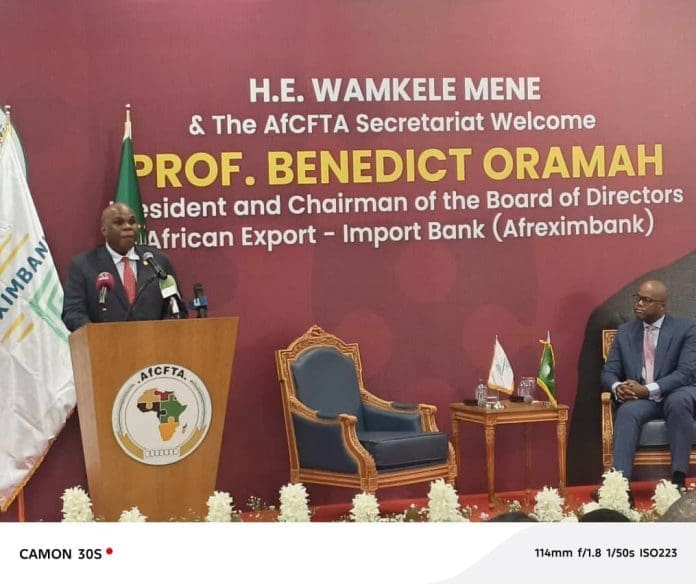The Outgoing President and Chairman of the African Export-Import Bank (Afreximbank), Prof. Benedict Oramah, has underscored the critical role the Bank is playing in advancing the African Continental Free Trade Area (AfCFTA) and accelerating Africa’s economic integration.
Delivering a public lecture at the AfCFTA Secretariat in Accra, during a farewell visit at the AfCFTA Secretariat in Accra on Thursday, October 2, 2025,
on the theme “The Nexus Between Trade Finance, Industrial Development and Economic Integration in Africa: The Role of Afreximbank,” Prof. Oramah noted that Afreximbank’s financial and technical interventions have been central to the Secretariat’s progress since its establishment in 2020.
According to him, Afreximbank has committed billions of dollars to support intra-African trade, financing industrial projects, and providing critical credit facilities to African banks. Through its Trade Facilitation Programme (AFTRAF), the Bank has onboarded more than 500 of Africa’s 600 commercial banks, providing over $5 billion in trade credit to boost cross-border transactions.
He pointed to the Bank’s pioneering work in launching the Pan-African Payment and Settlement System (PAPSS), which allows businesses to trade across the continent in local currencies, saving the region over $5 billion annually in transaction costs.
The Afreximbank President also cited the Intra-African Trade Fair (IATF) as a flagship initiative that has generated more than $160 billion in trade and investment deals across four editions, describing it as “the AfCFTA marketplace.”
On industrialization, Prof. Oramah revealed that Afreximbank financed over 50 industrial projects across the continent in 2024, including large industrial parks, energy infrastructure, and a petroleum refinery in Southern Africa. He stressed the Bank’s commitment to building a pan-African automotive value chain and supporting export-oriented industries.
He further highlighted the creation of the AfCFTA Adjustment Fund, designed to cushion governments, businesses, and private sector players against the shocks of the new trading regime. Afreximbank has already committed $1 billion in seed capital and a $10 million grant to operationalize the fund.
“Africa’s journey to economic integration requires more than trade agreements; it needs financing, infrastructure, knowledge, and policy support,” Prof. Oramah said. “Afreximbank is working hand-in-hand with the AfCFTA Secretariat, the African Union, national governments, and the private sector to deliver on this agenda.”
He concluded by calling on governments to avoid protectionism, regulators to cooperate across borders, and businesses to take bold steps into new markets. “If we succeed, Africa will transform from a collection of small economies into a unified economic bloc with the potential to rival other major regions,” he said.
In his welcome address,
Secretary-General of the African Continental Free Trade Area (AfCFTA) Secretariat, H.E. Wamkele Mene, has lauded outgoing Afreximbank President and Chairman of the Board, Professor Benedict Oramah, for his pivotal role in driving Africa’s economic integration and trade transformation.
Mr. Mene described Professor Oramah as a “senior brother” whose partnership with the AfCFTA had been both “enduring and impactful.”
He highlighted that under Oramah’s leadership, the collaboration between AfCFTA and Afreximbank moved from vision to implementation, producing tangible tools that traders across the continent now rely on.
“These are more than programmes,” Mr. Mene said. “They express a single vision: a self-reliant Africa that trades with itself, invests in its own potential, and shapes its future with purpose.”
Among the initiatives jointly advanced by Afreximbank and AfCFTA are the Adjustment Fund to support tariff reforms, the Pan-African Payment and Settlement System (PAPSS) for cross-border payments, MANSA for strengthening due diligence, the Intra-African Trade Fair, and strategic investments in priority value chains such as the automotive sector, agro-processing, pharmaceuticals, logistics, and the creative industries.
Mr. Mene also commended Afreximbank’s resilience in difficult times, recalling how the Bank stepped in to sustain trade and supply chains during economic shocks. “Integration works only when trade keeps flowing, and you stood with Africa when it mattered most,” he said.
Reflecting on Professor Oramah’s 10-year tenure since 2015, the Secretary-General noted the Bank’s remarkable growth in assets from US$5 billion in 2015 to US$37 billion in 2023, calling it a testament to his “clarity of purpose and belief in Africa’s capacity to compete.”
He stressed the need for the AfCFTA Secretariat and Afreximbank to deepen their collaboration, particularly in scaling up digital trade tools, strengthening regional value chains, addressing non-tariff barriers, and ensuring inclusivity for women, youth, and small businesses in Africa’s trading system.
“As we begin this public lecture, we do so in a spirit of gratitude and continuity,” Mr. Mene concluded. “The work goes on, and our partnership will deepen to make the next chapter even more ambitious and inclusive.”
Professor Oramah, who assumed office as Afreximbank’s third president in July 2015, is stepping down after a decade of transformative leadership.
Source: newsghana.com.gh











